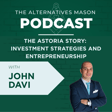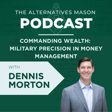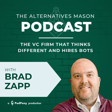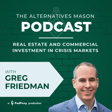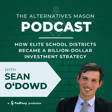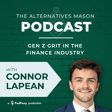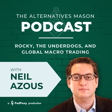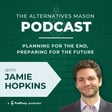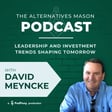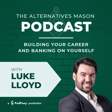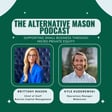
The Alternatives Mason: Building Alts Knowledge Brick by Brick | Episode 3 |Democratizing Access to Venture Capital Featuring Dave Thornton
Welcome to The Alternatives Mason: Building Alts Knowledge Brick by Brick. Banrion Capital Management uses technology to help independent advisors scale and educate themselves on alternative investments. Since education is such a big piece of the Banrion mission and business, we are excited to kick off this series to dive into the nits and grits of the alternatives space. Episode 3 "Democratizing Access to Venture Capital" features Dave Thornton, Co-Founder, CEO & CIO of Vested, one of Banrion Capital's partner asset managers.
Vested is pioneering index-like exposure to the VC asset class, across company stage, sector, and founding year. Vested acquires its exposure by providing funding to the departing employees of VC-backed companies, who find themselves in the acute distress of having 90 days to find the money to exercise their expiring stock options. This revolutionary approach allows Vested to provide liquidity for startup employees and along the way democratize access for investors to access the beta of venture capital unlike it’s ever been done before.
Dave is Vested’s Chief Executive Officer and Chief Investment Officer. For the last 11 years, Dave has been a serial entrepreneur. His most notable accomplishments include the founding and successful sale of PatientFinder, and his collaboration with Emilio Seijo (a Principal Quantitative Strategist at Vested) in the creation of a real-time illiquid asset pricing model which is algo-trading a $300M book at a name-brand bank. Dave also spent time building the systems at a hedge fund within Citigroup, and worked as a Program Manager at Microsoft. Dave received a BAS in Computer Science from the University of Pennsylvania’s School of Engineering and Applied Science and a BS in Economics with a concentration in Decision Processes from the University of Pennsylvania’s Wharton School. Dave earned a JD from Georgetown University.
Learn More About Vested: Vested Investor Site
LinkedIn: Dave J Thornton
Host Brittany Mason’s diverse background has given her a unique perspective stepping in to the role as Chief of Staff at Banríon Capital. Throughout her career she has embraced challenging projects proving her ability to lead the development and the successful launch of brands. From staffing, branding, and marketing, Brittany has spent the last 20 years working in the fashion and entertainment industry with some of the world’s most iconic brands. This includes but not limited to event management and production for high scale events like the Superbowl, Indianapolis 500, TAO Group, NYFW, Miami Fashion Week, product launches at Salesforce’s Dreamforce, CES, and partnerships with brands such as John Frieda, Eleven Australia, and Valentino.
Her extensive work in the industry motivated Brittany to produce her own events. In 2013 her first directorial project was to spread awareness for Prostate Cancer. This 1 minute campaign video reached 13 million in just a few short weeks. This is when Brittany began producing charity fashion shows and coaching young entrepreneurs under her brand MOXIE Media. In Just one year Brittany worked with approximately 100 thousand students. In 2017 Brittany launched MOXIE Media Productions in Ireland, becoming the Director and license holder of Miss Universe Ireland. Brittany is known for the rebrand and launch of the Universe brand in Ireland and over the course of 5 years built a historical track record for the country that earned several global awards. Miss Universe Ireland became one of the country’s most exclusive and sought out events to attend. In 2019 MOXIE Media gained the right to Miss Indiana USA and Miss Indiana Teen USA making it the first production company in history to participate in the 3 largest competitions year after year; M

